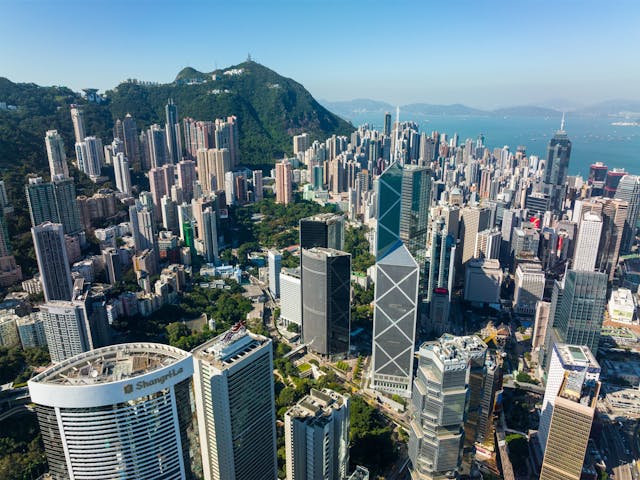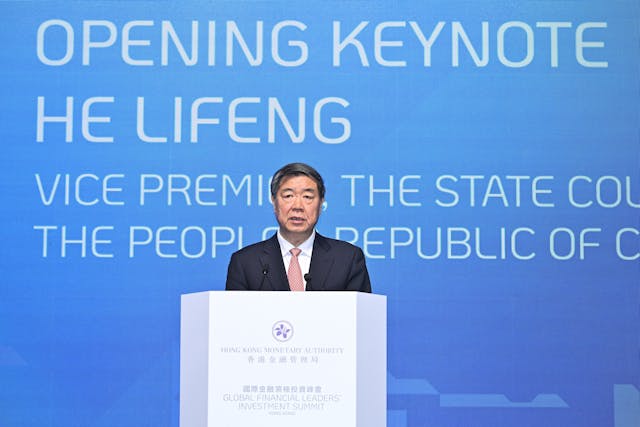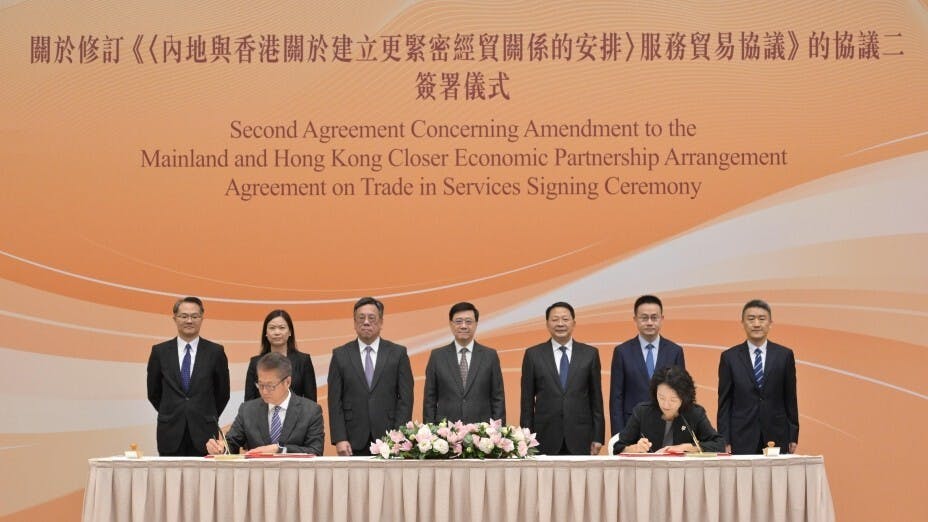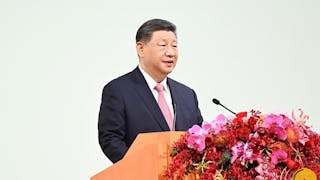2024年10月9日,香港財政司司長陳茂波與商務部國際貿易談判副代表李詠箑簽署了《〈內地與香港關於建立更緊密經貿關係的安排〉服務貿易協議》的第二份修訂案。李表示,商務部將繼續支持香港特區發揮優勢,全面深化改革,為推動高品質對外開放做出更大貢獻。
她的講話不僅顯示中央對香港經濟的全力支持,而且經濟自由化政策也證明了國家持續開放的進程。換句話,經濟自由化體現在中國對香港的政策,特別是以優惠待遇吸引香港企業進入內地市場,這是應對特朗普明年初重返白宮下,中美貿易可能惡化而採取的特殊措施。
陳表示,修訂後的安排對中港都有好處,讓香港企業更容易和快捷地進入大灣區市場,並且降低了從事專業服務的港企在內地開展業務的相關成本。
該修訂案將於2025年3月1日起實施,放寬範圍包括銀行證券、保險、電信、旅遊、電影電視、建築和工程服務七大產業。
此次修訂的特點在於,香港企業將被允許在內地開展業務時使用香港法律和仲裁服務,同時讓它們提供跨境服務時享受內地法規下的優惠待遇。這種對香港企業適用香港法律的做法,將大大激勵他們進入龐大的中國市場。其中,對營運紀錄不足三年的公司也有資格享有修訂後的CEPA優惠,這對於相對較新的港企來說屬於非常不錯的待遇。

降低市場門檻 有利香港服務商投資內地
從自由主義角度來看,CEPA修訂降低了市場准入門檻,有利於香港服務提供者率先進入內地,是一種自由主義經濟激勵,以吸引港企進入內地。
從行業角度來看,香港建築工程行業可以將其測量服務以顧問形式移至廣東來提供,這是與廣東同行業務拓展和專業融合的一步。影視業透過內地放映審批後向內地出售或發行影視節目,受益匪淺,帶動了香港影視業的發展。旅遊業也頗受惠,外國遊客可以且將被允許透過香港在廣東連續停留144小時並免簽。這項措施也將直接或間接惠及郵輪業。
新安排也有利於旅遊公司,如果它們與內地和澳門的旅遊公司配合良好,將為大灣區的遊客提供多個不同的旅遊景點。
金融領域方面,內地取消在香港提供服務的外資銀行發行銀行卡的限制。另外,允許資產不超過20億美元的香港金融機構投資內地保險業,這意味着規模較小的香港保險公司可以更容易進入內地市場。最後,在電信領域,內地允許香港服務提供者提銷售可在全球使用的電話卡。
今年11月1日,中港證券監管機構共同發布關於首批符合參與大灣區跨境理財通的試點計劃名單,首批14家香港持牌機構為大灣區投資者提供跨國投資服務,這些機構將與中方批准的中方合作夥伴共同提供服務。
根據內地「十四五」規劃(2021-2025年),香港政府也深化和拓寬內地與香港金融市場的互聯互通。理財通自2021年9月上線以來逐步發展,今年2月採取了優化措施。香港金管局與內地金融監管機構合作,擴大在離岸市場使用境內債券作為抵押品的範圍,包括使用北向債券通下的境內債券作為北向掉期通交易的合資格保證金抵押品。

鞏固港國際金融中心地位 是國家需要
上周二(19日),國務院副總理何立峰來港在國際金融領袖投資峰會發表主題演講。他強調建設和鞏固香港國際金融中心的地位,不僅是香港的需要,也是國家的需要。他認為,中央政府從戰略高度將香港定位為國際金融中心,支持香港深化金融改革、確保金融穩定的進程。
總體而言,中國最近對香港採取的措施證明了其經濟自由化的堅持。香港作為一個資本主義城市,擁有不同的普通法制度和堅實的金融中心。中國在充分利用香港特區、在持續深化和發展金融貨幣改革過程中實現雙贏的一貫立場。經濟相互依存是內地金融政策制定者所採取的準則。
這些經濟自由化措施對澳門也有重要影響,澳門有望透過橫琴粵澳深度合作區實現經濟多元化,債券和證券市場很可能會追隨香港持續改革步伐進一步發展。相信澳門能夠將會從CEPA的一些修訂中受益,特別是在旅遊業方面,澳門旅遊當局可以與香港和其他大灣區城市合作,加強澳門作為特殊國際旅遊休閒中心的地位。因此,香港和澳門將繼續在中國的經濟自由化過程中發揮至關重要的作用,特別是內地透過離岸中心加速人民幣國際化的使命。顯然,香港和澳門必須在未來幾十年充分發揮內地的使命,充分發揮自身潛力。
China’s economic liberalisation: The role of Hong Kong and Macau
Recently, the central authorities in Beijing have implemented three important measures of economic liberalisation toward the Hong Kong Special Administrative Region (HKSAR)—measures that have implications for Macau.
First and foremost, on October 9, 2024, the Closer Economic Partnership Arrangement (CEPA) was amended and expanded. CPEA was signed in 2003 as part of Beijing’s attempts at reviving and revitalising the economy of Hong Kong after the Severe Acute Respiratory Syndrome (SARS) undermined the local economic development. In November 2019, CEPA was amended to expand the scope to cover 153 service sectors.
The most recent amendments were signed in a ceremony attended by not only Hong Kong Financial Secretary Paul Chan but also Li Yongjie, the deputy international trade representative for the Ministry of Commerce in China. Li said that her department is committed to implementing the principle of “one country, two systems.” Furthermore, she remarked that the Ministry would continue to support the HKSAR by leveraging its strengths and advantages and to deepen reforms comprehensively and contribute more to a high-quality opening-up process for external parties.
Her remarks were important because the CEPA amendments signal not just the central government’s full support of Hong Kong’s economic sectors but also its economic liberalisation measures that testify China’s continuous opening-up process. In other words, economic liberalisation can be seen in China’s policy toward Hong Kong and its utilisation of the HKSAR to attract Hong Kong companies to enter the mainland market through preferential treatment—a special measure to prepare for a likely deterioration of Sino-US trade and economic relations soon under the returning administration led by Donald Trump.
Paul Chan said that the amended arrangement will benefit both the HKSAR and the mainland, a win-win scenario in which Hong Kong companies will be allowed easier and faster access to the cities in the Greater Bay Area (GBA), where the huge population of 86 million represents a tremendous market for Hong Kong businesses. This easier access is facilitated by the reduction of related costs for many service sectors for Hong Kong to open their companies and conduct businesses on the mainland.
The amendments will take effect on March 1, 2025, and they will cover relaxation in the seven industries, namely banking and securities, insurance, telecommunications, tourism, film, television, and construction and engineering services.
What is unique in the amendments is that Hong Kong-based companies will be allowed to use Hong Kong laws and arbitration services for their mainland businesses, while allowing them to be treated with preferential treatment under mainland regulations across the border. In a sense, a hybrid legal system is to be adopted in dealing with the entry of Hong Kong companies to the mainland. This usage of Hong Kong law for Hong Kong companies will be a great incentive for them to infiltrate the huge Chinese market in the mainland.
Companies with fewer than three years of operational experience are also eligible for CEPA benefits under the amendments—again, a preferential treatment that is very generous to the relatively new Hong Kong companies.
From a liberal perspective, the CEPA amendments lower market entry barriers and assist the Hong Kong service suppliers in their first move into the mainland—a kind of liberal economic incentive to lure the Hong Kong companies to move into the mainland.
From a sectoral perspective, the Hong Kong construction and engineering sector can have its surveying service to be provided in Guangdong as consultancies—a step toward business expansion and professional integration with the Guangdong counterparts. The film and television industries benefit tremendously by having their films and television programs be sold or distributed to the mainland authorities after the mainland’s screening and approval—a boost to the film and television businesses in Hong Kong. Tourism also benefits tremendously, as foreign tourists can and will be allowed to stay in Guangdong for 144 hours continuously through Hong Kong with a visa exemption. This measure will also directly or indirectly benefit the cruise industry. The new arrangements will also benefit tourist companies that will provide many different tourist spots for tourists in the Greater Bay Area, if they coordinate well with the tourist companies in the mainland and Macau. In the monetary sector, the mainland cancels the restriction of disallowing those foreign banks that provide services in Hong Kong to issue bank cards. Hong Kong’s monetary institutions that invest in the mainland insurance sector can have their assets less than US$2 billion, meaning that smaller Hong Kong insurance companies can and will be able to penetrate the mainland market more easily. Finally, in telecommunications, the mainland allows Hong Kong service providers to provide and sell phone cards that can be used globally.
The recent Chinese measures on Hong Kong are a testimony to its persistence in economic liberalisation. Hong Kong, as a capitalistic city with a different common-law system and solid financial centre
On November 1, 2024, the China Securities Regulatory Commission and the Securities and Futures Commission of Hong Kong issued an announcement on the first batch of brokers eligible to participate in the Guangdong-Hong Kong-Macau GBA Cross-Boundary Wealth Management Connect Pilot Scheme (Wealth Management Connect). Fourteen Hong Kong licensed corporations have been included in the first batch of brokers to offer cross-boundary investment services for GBA investors. They will work in partnership with their mainland partnering companies, as confirmed by the China Securities Regulatory Commission.
In accordance with the mainland’s 14th five-year plan, the Hong Kong government also deepens and widens mutual access between the mainland and Hong Kong financial markets. The Wealth Management Connect has been developing gradually since its implementation in September 2021. In February 2024, its enhancement measures were taken. The Hong Kong Monetary Authority worked with the mainland financial regulatory authority to broaden the use of onshore bonds as collateral in the offshore market, including the use of onshore bounds under the Northbound Bond Connect as eligible margin collateral for Northbound Swap Connect transactions. This will vitalise offshore investors’ onshore bond holdings and enhance the attractiveness of onshore bounds, promoting synergies between Bond Connect and Swap Connect, thereby vitalising market participation in the Connect Schemes (see: Hong Kong Monetary Authority, Eddie Yue on Recent developments in financial cooperation between Hong Kong and the Mainland (hkma.gov.hk)).
In November 2024, with the first batch of brokers participating in the Wealth Management Connect, the GBA residents’ demands for asset allocation can be met more swiftly and effectively. The new measures also help to enhance Hong Kong’s role as an international asset centre while contributing to China’s open-up process in its financial market.
On November 19, 2024, the Vice Premier of the Chinese government’s State Council, He Lifeng, came to Hong Kong to deliver a keynote speech at the Global Financial Leaders’ Investment Summit. He gave an important speech, emphasising that building up and consolidating Hong Kong as an international financial centre is not only necessary for the HKSAR but also for China. The central government, to him, positions the HKSAR as an international financial centre from a strategic perspective, and it supports Hong Kong’s process of deepening financial reform and ensuring its financial stability.
The Vice Premier suggested three measures for Hong Kong to retain and consolidate its status as an international financial centre: Hong Kong must deepen financial and monetary reforms (including the strengthening of industrial sectors of banks, securities, insurance, and the provision of offshore Renminbi services), support the setting up of a high-quality international asset management centre, and improve the policy environment for both financial and monetary development.
Macau as a special international tourism and leisure hub. As such, both Hong Kong and Macau will continue to play a crucial role in China’s economic liberalisation, especially the mainland’s mission of accelerating the internationalisation of Renminbi through its offshore centres
Mr. He’s remarks were important because he affirms the central government’s belief that Hong Kong’s international financial centre must have its status enhanced through continuous reform and that Hong Kong is beneficial to China’s opening-up process. As such, the Vice Premier adopts a liberal economic perspective in dealing with Hong Kong’s financial and monetary development.
Overall, the recent Chinese measures on Hong Kong are a testimony to its persistence in economic liberalisation. Hong Kong, as a capitalistic city with a different common-law system and solid financial centre. China remains very consistent in utilising the HKSAR to the full extent, achieving a win-win situation in which both sides benefit from the processes of continuing, deepening, and developing financial and monetary reforms. Economic interdependence is the norm adopted by the mainland’s financial policymakers.
The amended CPEA, the Wealth Management Connect and its enhancement measures, and the announcement of brokers eligible to participate in the Cross-Border Wealth Management Connect Pilot Scheme are all important policy measures taken by both the central authorities in Beijing and the HKSAR authorities to liberalise their economies and capital markets, to capitalise on the strengths of “one country, two systems” in the economic and financial aspects, to implement reforms in a step-by-step manner, and to leverage Hong Kong’s advantages in China’s persistent economic liberalisation, especially in the GBA region.
These economic liberalisation measures have important implications for Macau, which is expected to diversify its economy through the Guangdong-Macau In-Depth Cooperation Zone in Hengqin, where the development of bonds and securities will very likely follow the footsteps of Hong Kong’s sustained reforms in cross-border financial and monetary industries in the recent months and years. Macau can and will benefit from some of the CEPA amendments, notably in tourism, where the tourism authorities in Macau can work with Hong Kong and other GBA cities to strengthen Macau as a special international tourism and leisure hub. As such, both Hong Kong and Macau will continue to play a crucial role in China’s economic liberalisation, especially the mainland’s mission of accelerating the internationalisation of Renminbi through its offshore centres. Clearly, Hong Kong and Macau must capitalise on this mainland’s mission and maximise their own potentials to the full extent in the coming decades.
原刊於澳門新聞通訊社(MNA)網站,本社獲作者授權轉載。(原文按此)



































